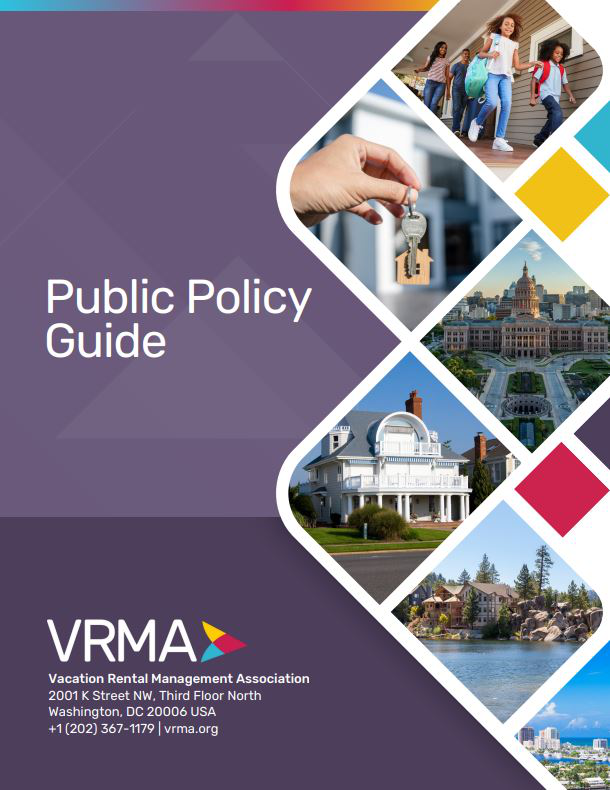Our goal is to help policymakers make informed decisions about legislation that impacts vacation rental professionals, guests, and the industry at-large.
We encourage all policymakers to review our policy guide (below) in addition to the resources available on this site.
 VRMA Policy Guide
VRMA Policy Guide
VRMA believes that government policies must continue to promote and preserve the value of professionally managed short-term rentals (STVRs). As the leading organization in the industry, VRMA supports efforts to regulate and standardize rules within the lodging market.
Our policy guide outlines VRMA's position on a variety of important topics related to the industry.
Download Full Policy Guide
Download One Pager
Property Rights
Ability to Rent
- VRMA supports and encourages communities to recognize the rights of property owners to rent their primary and secondary properties.
- VRMA believes legislation that places limitations on the frequency or duration of stay should be done as a last resort and only in cases where it is backed by data and that deems such restrictions necessary.
- VRMA strongly believes that communities must provide equal protection to all residential properties.
Limitations on Frequency, Duration of Stay, or Occupancy
- VRMA supports regulations that place limitations on the number of occupants per unit that are uniform to current rules for other existing residential structures.
- VRMA opposes the placement of unenforceable time restrictions on property guests that are not uniform with other residential property uses and hotels, motels, and bed-and-breakfasts.
- VRMA endorses reasonable standards for occupancy based on recognized uniform building and zoning codes.
- VRMA supports transparency in occupancy requirements and marketing.
Land Use and Zoning
Residential vs. Commercial
- VRMA believes that all uses of rental properties are residential use, and the application of rules on STVRs should be uniform, simple, justified, proportionate, and enforceable.
- VRMA opposes classifying STVR properties as commercial use by comparing them to hotels.
- VRMA opposes health and safety regulations that specifically target STVR properties and create a burden of compliance beyond regulations in place for similarly zoned properties.
- VRMA opposes parking regulations that specifically target STVR properties and encourages communities to maintain the same parking regulations that are in place for other similar zoned properties.
Economic Impact
- VRMA encourages communities to support the thousands of small businesses that operate and maintain STVRs and acknowledge their economic impact.
- VRMA recognizes the positive impacts that STVR has on local communities through taxes, increased economic activity, and promoting the local travel and tourism industry.
- VRMA's National Housing Study, in partnership with Oxford Economics, identified that STVRs play only a minimal role nationwide on housing and rent costs. At the same time, economic impact studies show the massive boom STVRs have on local and state economies, providing well-paying jobs and increased tax revenue that governments can use to address the root causes of housing affordability.
Tax Policy
Lodging Taxes
- VRMA believes that, where required, STVR property owners are legally responsible for the collection and remittance of clear and concise transient occupancy or lodging taxes, whether they use a professional property manager or not.
- VRMA supports and encourages property managers, online travel agencies (OTA), and other online platforms to assist in occupancy or lodging tax compliance.
- VRMA also encourages governments to carefully consider the adoption of voluntary collection agreements on local property managers and connected parties.
- VRMA supports localities accepting online remittance of lodging taxes.
- VRMA encourages taxation parity among all hospitality sectors. Additional taxes should not be placed on STVRs that ultimately place the burden on the guest. All members of the hospitality sector should be held accountable for the remittance of all required taxes.
State and Local Taxes
- VRMA supports state and federal laws that preserve secondary home tax deductions.
- VRMA opposes additional targeted taxation on the travel and tourism industry that discourages consumer spending on leisure and vacation stays, and negatively impacts state and local economic activity.
- VRMA discerns that STVR properties are residential and the property taxes applied to those properties should reflect that designation.
- VRMA supports transparency in allocation and usage of taxes.